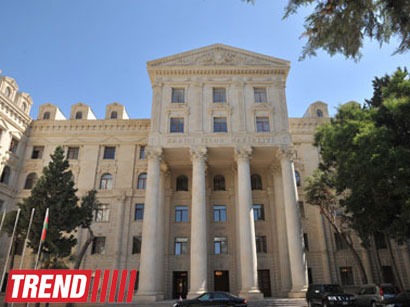Azerbaijan, Baku, Oct. 24 / Trend S. Agayeva /
While making statements like the recent ones in Mexico, Armenian Foreign Minister Edward Nalbandian forgets about the country he represents, spokesman for the Azerbaijani Foreign Ministry Elman Abdullayev said at a briefing on Wednesday.
"Nalbandian forgets that he represents the power which is held by the blood of his country's people," Abdullayev said.
He added that it seems that Armenian President Serzh Sargsyan instructed his minister to be provocative towards Azerbaijan.
"However, Armenia will fail to do this," Abdullayev said.
He said the Armenian authorities entirely depend on the Armenian lobby and operate under nationalist slogans.
Armenian Foreign Minister Edward Nalbandian during his tour to Latin America said at a meeting with members of the Mexican Senate that some actions have damaged Armenian-Mexican relations.
According to Mediamax, Edward Nalbandian stressed that he means that the resolution on Nagorno-Karabakh conflict adopted by the Senate and Mexican Chamber of Deputies of the previous convocation is contradicting the position of the international community.
Mexico was the first country to adopt a resolution condemning the Khojaly genocide.
The Armenian military forces committed genocide in Khojaly on Feb. 26, 1992. Some 613 people were killed, including 63 children, 106 women and 70 old men.
A total of 1000 civilians were disabled during the genocide. Eight families were annihilated, 130 children lost one parent and 25 lost both. Additionally, 1275 innocent residents were taken hostage, while the fate of 150 remains unknown.
The conflict between the two South Caucasus countries began in 1988 when Armenia made territorial claims against Azerbaijan. Armenian armed forces have occupied 20 per cent of Azerbaijan since 1992, including the Nagorno-Karabakh region and seven surrounding districts.
Azerbaijan and Armenia signed a ceasefire agreement in 1994. The co-chairs of the OSCE Minsk Group - Russia, France and the U.S. - are currently holding peace negotiations.
Armenia has not yet implemented the U.N. Security Council's four resolutions on the liberation of the Nagorno-Karabakh and the surrounding regions.






